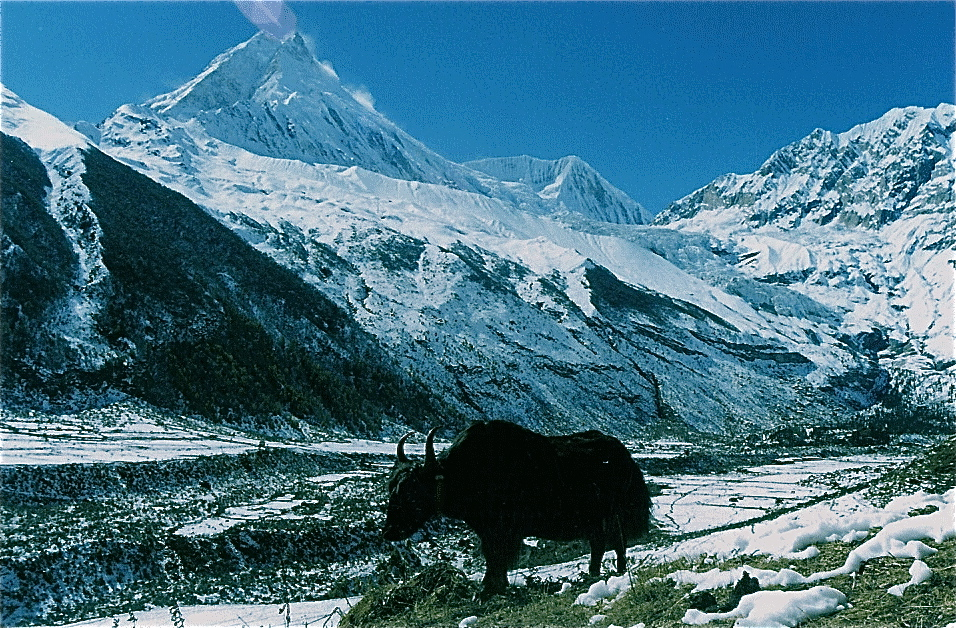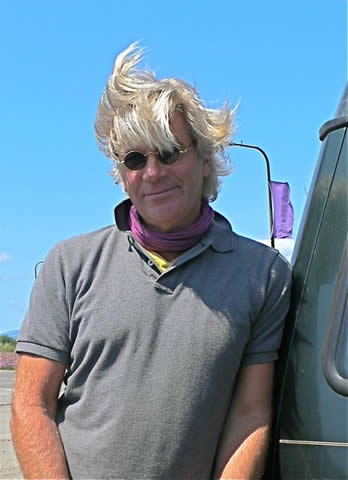|
TOWARD A SCIENCE OF CONSCIOUSNESS The Tucson Conference 2014 - 20th Anniversary APRIl 21-26, 2014 Tucson - University Park Marriott under the direction of the Center for CONSCIOUSNESS STUDIES, University of Arizona 2014 Pre-Conference Workshop
The Healthy Human Mind, Tibetan Lamas and The Science of the Stream of Consciousness
Research on the nature of the healthy human mind amongst Tibetan lamas in South and Central Asia
Presenter: Henry M. Vyner MD Date: Tuesday morning, April 22, 2014 Session: 9:00 am - 1:00 pm Room: tba
Manaslu (26,759 feet) With the Tibetan Village of Samma Beneath It ** Henry M. Vyner, MD
“Thoughts' and 'things' are names for two sorts of object...” William James1
For the last 22 years, Dr. Henry Vyner* has been conducting research on the nature of the healthy human mind amongst Tibetan lamas living in South and Central Asia. In this research, Dr. Vyner has been interviewing lamas about their experiences of their own mind in meditation for the purpose of: 1. Developing a descriptive science, or typology, of the phenomena that appear in the stream of consciousness. 2. Deriving an empirically valid theory of the nature of the healthy mind from that descriptive science. This research is generating a new field of scientific inquiry: a science of the phenomena that appear in the stream of consciousness.2,3 One of the salient findings of this new field of inquiry has been that the egoless mind is a far healthier mind than the egocentric mind,4 and that as a species we have long been operating on the mistaken and unexamined assumption that the egocentric mind is a healthy mind. In addition, the science of the stream of consciousness is setting aside the question of whether or not it is possible to scientifically study consciousness, and simply moves forward and takes up the empirical study of the phenomena that appear in the stream of consciousness.
Dr. Vyner’s workshop is going to present: (1) An overview of Dr. Vyner’s findings on the nature of the healthy mind. (2) A systematic introduction to the science of the phenomena that appear in the stream of consciousness. WORKSHOP DESCRIPTION The workshop will be comprised of three sections. The first section will present a systematic overview of the data that shows that the egoless mind is a healthy mind. The second and third sections will present the methodology and philosophy of science that are the foundation of the science of the stream of consciousness: I. THE HEALTHY MIND: THE FINDINGS OF THE SCIENCE OF THE STREAM OF CONSCIOUSNESS A. The Descriptive Science of the Phenomena that appear in the Stream of Consciousness 1. This descriptive science is a typology of the phenomena that appear in the stream of consciousness. The descriptive science defines phenomena by their form, as opposed to content, and to give you a first idea of the kind of phenomena that it delineates, here are a few examples of the phenomena that we have found: a. The Involuntary Stream of Consciousness b. Individual Moments of Consciousness c. Repression d. Dissolution e. Nondual Awareness f. Nondual Epiphany B. This descriptive science will then be marshaled to describe an additional group of findings:
II. THE PHILOSOPHY OF SCIENCE OF THE SCIENCE OF THE STREAM OF CONSCIOUSNESS
A. This section of the workshop will show that the philosophy of science that supports the day-to-day practice of modern science will also support the empirical study of the phenomena that appear in the stream of consciousness. B. This section will affirm that it is possible to empirically study these phenomena by: (1) Presenting the results of our research (2) Demonstrating how the interpersonal verification of our findings is attained (3) Showing that the phenomena that appear in the stream of consciousness are simultaneously subjective and objective phenomena.3 This means that these phenomena, just like photons and electrons, are paradoxical phenomena. Given that they are objective phenomena, they are phenomena that can be studied by science.
III. METHODOLOGY
A. This section of the workshop will present the methodology of the science of the stream of consciousness by showing how our interviews are done. There will be interviews of: 1. A Tibetan lama 2. The audience as a whole 3. Individual members of the audience ------- Henry M. Vyner M.D is an American physician and cultural anthropologist who has been living and working in the Himalayan region for the last 22 years. He has done much of his work there as a Research Fellow in both the Department of Anthropology and the Center for Nepal and Asian Studies (CNAS) at Tribhuvan University in Kathmandu, Nepal. Dr. Vyner studied medicine and psychiatry at the University of Maryland School of Medicine, got a degree in cultural anthropology at the University of California at Berkeley, was the Director of Medical Research at the Radiation Research Institute in Berkeley and was twice a Visiting Scholar at UC-Berkeley during his tenure in Asia. Dr. Vyner gives free medical care to all of the villages and monasteries to which he goes to do his research. His research has won an award from the American Anthropological Association, and the first four volumes of an ongoing series that collect his research interviews have already been published. 6,7,8,9
NOTES
* Department of Anthropology and The Center for Nepal and Asian Studies, Tribhuvan University; Kathmandu, Nepal (Retired). ** Photo: Manaslu (26,759 feet) With the Tibetan Village of Samma Beneath It (Courtesy of H. Vyner) 1 W. James, Does 'Consciousness' Exist? Journal of Philosophy, Psychology, and Scientific Methods 1, 477-491 (1904). 2 H.M. Vyner, The descriptive science of Tibetan Buddhist mind science and the nature of the healthy human mind. Anthropology of Consciousness 113(2), 1-26 (2003). 3 H.M. Vyner, Dialectical phenomena and processes of the mind. Imagination, Cognition and Personality 27(2) 163-196 (2007-2008). 4 H.M. Vyner, A preliminary theory of the defining dynamic of the healthy human mind. Imagination, Cognition and Personality 29 (3) 225- 270 (2009-2010). 5 H.M. Vyner, The Healthy Human Mind, forthcoming. 6 H.M. Vyner, The Healthy Mind Interviews: Khenpo Nyima Wangyal (Vajra Books, Kathmandu, 2004a). 7 H.M. Vyner, The Health Mind Interviews: Khenpo Tsewang Gyatso (Vajra Books, Kathmandu, 2004b). 8 H.M. Vyner, The Healthy Mind Interviews: Lopon Tekchoke (Vajra Books, Kathmandu, 2005). 9 H.M. Vyner, The Healthy Mind Interviews: The Dalai Lama, Lopon Tenzin Namdak and Lopon Tekchoke (Vajra Books, Kathmandu, 2007).
|
|
|||||||||||||

